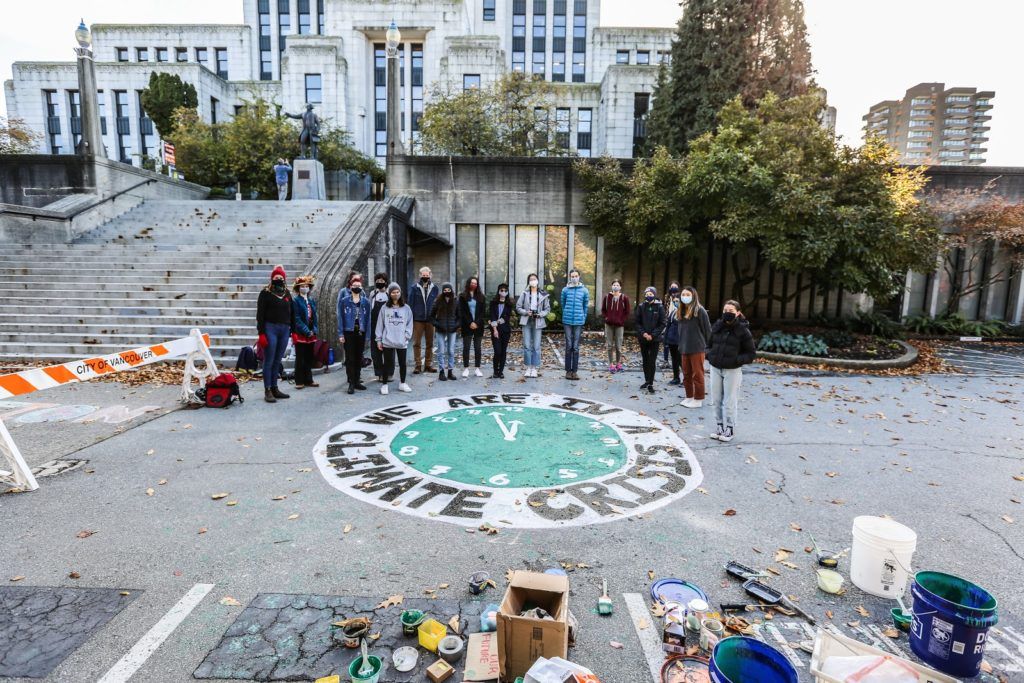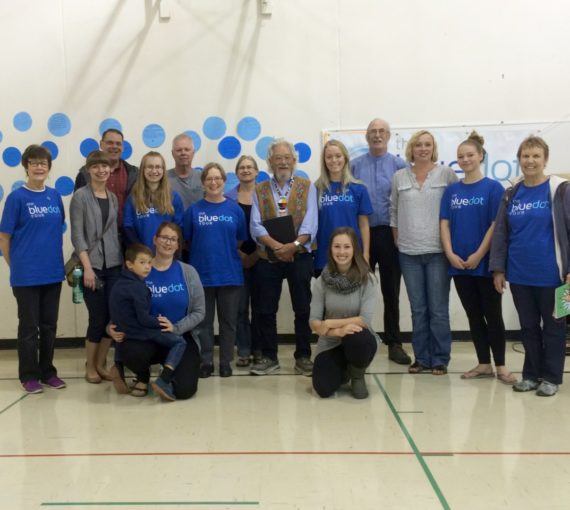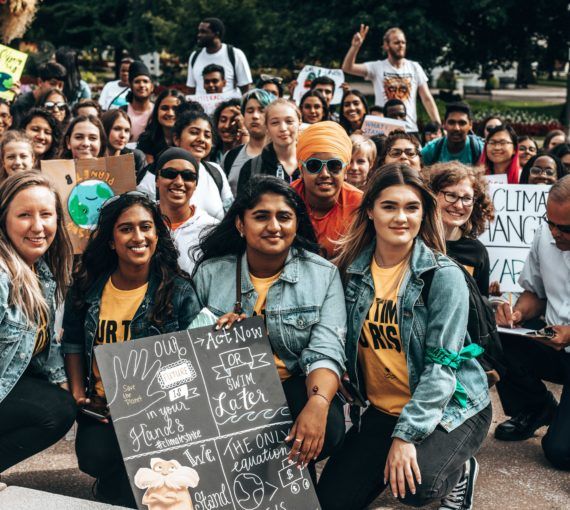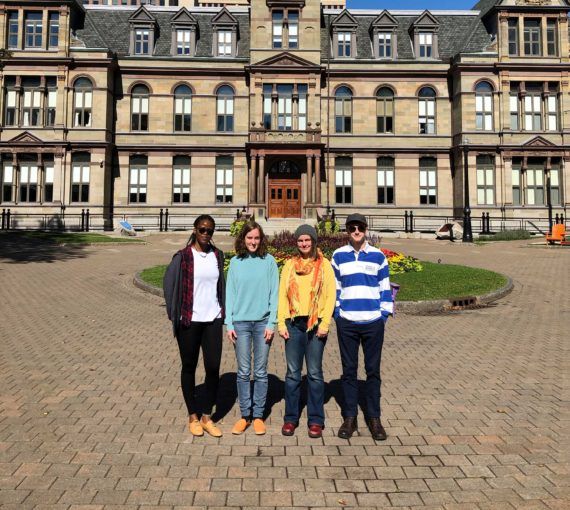
Some of the Sustainabiliteens paint a mural outside Vancouver City Hall (Photo: Rachel Lando)
On November 17, 2020, Vancouver city council voted on an ambitious Climate Emergency Action Plan, almost a year after the motion to declare a climate emergency was brought to council.
It was an important day for everyone involved, but a long one. Anica and Naia Lee, siblings and Vancouver high school students, had their eyes glued to the virtual meeting at city hall. All day they had been tracking the proceedings, organizing a live-streamed watch party and rallying with other youth climate activists to drum up support for the plan.
Council had to vote on each piece of the 371-page Climate Emergency Action Plan individually. So, by late evening, 15-year-old Anica was tired. “I actually didn’t stay up to see voting through because I had school the next day. But I remember waking up in the morning and seeing the news and saying, ‘Wait, is this real?’”
In the end, the plan passed almost unanimously. “We were not really expecting that, to be honest,” admits Naia, age 18, who now works at Youth Climate Lab. “We were prepared to keep organizing.”
Anica and Naia are members of the Sustainabiliteens, a youth climate justice group based in Metro Vancouver. Along with a network of other local climate groups, the Sustainabiliteens have been organizing around the Climate Emergency Action Plan ever since Coun. Christine Boyle first brought forward a symbolic motion to declare a climate emergency in 2019.
With the help of letter-writing campaigns and strikes outside city hall, the Sustainabiliteens mobilized a major wave of community support for the declaration and the Climate Action Plan that would follow. Eventually, they began to work directly with staff and councillor allies to give feedback on the plan itself and ensure that council would pass it. The final recommendations are anything but symbolic, setting the city on a path to a 50 per cent reduction in greenhouse gas emissions by 2030.
We’re not trying to make everyone in the world a climate activist. We’re actually trying to bring climate into our other identities and think about how climate affects each aspect of our lives.
Naia Lee
Naia acknowledges that climate action can sometimes be frustratingly slow and incremental, especially at higher levels of government. By contrast, municipal government is one arena where she feels she’s been able to make a big impact.
“Working with Vancouver city council has really been a bright spot for me,” she says. “I’ve been able to practise new skills to make change at the local level. Pushing council to be as ambitious as they can be is actually really exciting.”
Naia didn’t start out with an interest in climate advocacy. She’d initially been passionate about gender justice and was drawn to climate action when she saw that many policies that could be used to combat climate change could tackle social inequality at the same time. “I hadn’t really seen that kind of visioning before,” she says. “I ended up in climate organizing as a way to bring together all the different things I was passionate about.”
After watching Naia work with the Sustainabiliteens, it was only a matter of time before Anica would also get involved. “I definitely didn’t know that much when I first started,” she says. “I only had Environment Club experience from school! I remember showing up to the first group meeting over Zoom and being a little scared, but everyone was really helpful and welcoming.” Over time, Anica became more confident within the group. She recalls how rewarding it was to have city staff value her opinions and priorities as they began to shape the Climate Emergency Action Plan.
It’s been really cool to figure out ways to influence those structures and make ourselves heard in spaces we’ve historically been excluded from.
Naia Lee
The siblings didn’t start out knowing how to work with their local government. This is why they encourage community members, especially youth, not to be deterred by a lack of experience, and instead find a supportive community to learn alongside. “There’s a lot of concrete knowledge we’ve absorbed over time about the structures and rules of municipal government,” Naia says. “It’s been really cool to figure out ways to influence those structures and make ourselves heard in spaces we’ve historically been excluded from.”
For peers across the country looking to get involved, Anica and Naia recommend exploring Youth Climate Lab’s “Youth Infiltration Manual,” which aims to demystify municipal government structures and provide youth with practical knowledge on how to take local climate action.
Naia also wants to remind others that you don’t need to identify as an activist to start working with your local government. “We’re not trying to make everyone in the world a climate activist. We’re actually trying to bring climate into our other identities and think about how climate affects each aspect of our lives.”
In fact, this is a strategy that has helped the Sustainabiliteens find common ground with city staff, councillors and the community. “Find out people’s interests, passions or values, and then figure out how that connects to climate,” Naia recommends. “That’s often what draws us as climate organizers to this work as well.”
What is Anica and Naia’s shared vision for the future of climate action in Vancouver? They want the city to view every conversation, idea and municipal policy through a climate lens. They want to see a focus on justice and equity, with efforts to lift up leadership from communities that are most affected by climate change. Their hope is that the Vancouver Climate Emergency Action Plan will inspire other municipalities to develop their own versions of bold visioning and leadership.
Naia has one simple piece of advice for folks who want to help make that happen: “At the end of the day, bringing people together around community and shared values is the most important thing. Everything becomes a lot more possible and a lot less heavy when you’re in a community of other folks working toward the same things you want to see.”
This story is part of Your voice at the table: A guide to mobilizing local government climate action. Learn to work with your local government so you can build a healthy, sustainable, resilient future together.



